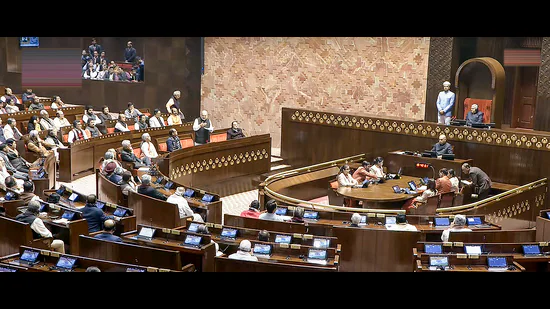The Missed Opportunity: Congress's Fumbled Play in the Parliamentary Debate on the Indian Constitution
Burocrazy Exclusive
New Delhi: Union Home Minister Amit Shah speaks during the Constitution debate in the Rajya Sabha at the Winter session of Parliament, in New Delhi, Tuesday, Dec. 17, 2024.
News in Brief
New Delhi: The 75th anniversary of the Indian Constitution saw parliamentary debates devolve into political sparring, with the Congress-led opposition losing an opportunity to hold the Modi government accountable. The BJP, led by PM Modi and Defence Minister Rajnath Singh, turned the focus on Congress's historical lapses, such as the 1975 Emergency and the Shah Bano case. Modi's speech strategically tied these to contemporary issues, putting Congress on the defensive. Rahul Gandhi’s late arrival symbolized the opposition's broader unpreparedness. This episode highlighted the BJP’s narrative control and the opposition's failure to address pressing constitutional concerns effectively.
New Delhi: The recent parliamentary discourse commemorating 75 years of the Indian Constitution was meant to be a celebration of democratic values, a reflection on the nation's constitutional journey, and a critical examination of its application over the decades. Instead, it morphed into a political battleground where the Congress-led opposition not only failed to leverage the moment to hold the Modi government accountable but also handed the BJP an opportunity to expose historical lapses by Congress in constitutional governance.
The debate, spanning four days with two sessions each in the Lok Sabha and Rajya Sabha, was an arena for political rhetoric rather than constitutional scholarship. The ruling party, led by Prime Minister Narendra Modi and supported by fiery speeches from Defence Minister Rajnath Singh, turned the tables on the opposition. They did this by focusing on what they portrayed as Congress's historical misdeeds against the very document they were supposed to celebrate.
From the outset, Rajnath Singh set a combative tone by recalling how the Congress government had maneuvered around constitutional principles. He cited the First Amendment of 1951, which was seen by some as an early example of the ruling party's willingness to amend the Constitution to suit political needs, particularly in the area of free speech. This was just the beginning, as the BJP's narrative built up to one of their strongest points - the Emergency of 1975 under Indira Gandhi, a period where constitutional rights were significantly curtailed, and democracy was arguably at its most vulnerable in India's history post-independence.
Prime Minister Modi's speech was a strategic masterstroke in this context. He not only revisited these historical moments but also connected them to contemporary political discourse. He mentioned the Shah Bano case, where the Congress-led government was accused of pandering to religious sentiments over constitutional principles, thereby undermining judicial autonomy. Modi's critique was not just historical; he tied these events to current debates on judicial independence and the rule of law, subtly suggesting that such tendencies could still be present in today's opposition politics.
The opposition, particularly the Congress, found itself on the back foot. Rahul Gandhi, who had ostensibly pushed for this debate in a letter to the Speaker, arrived late, giving the impression of disengagement at a crucial moment where leadership and a clear, counter-narrative were needed. This tardiness was not just about punctuality; it symbolized a broader unpreparedness or underestimation of how the ruling party would use the platform.
The disappointment within the Congress ranks was palpable. They had envisioned this debate as an opportunity to question the Modi government's actions towards the judiciary, media freedom, and federalism. However, instead of setting the agenda, they were dragged into defending their past, which, despite its significant achievements, was blemished by events like the Emergency, the postal ordinance, and other instances where constitutional propriety was questioned.
The BJP's strategy was clear: use the constitutional debate to not only defend their governance but also to paint a picture of the Congress as inconsistent guardians of the Constitution they helped draft. They highlighted the contradictions, from the 1975 Emergency to the 1986 Shah Bano case, and even more recent examples like the handling of the National Advisory Council during UPA's tenure, which was accused of overstepping executive boundaries.
The veteran parliamentarian's comment, likening the situation to "offering a stick to the ruling party to be beaten," captures this sentiment perfectly. It reflects a tactical error by the opposition, where instead of using the Constitution's 75th anniversary to critique current governance, they were cornered into a defensive position about their historical governance.
Moreover, the Congress and its allies failed to pivot the discussion towards the pressing constitutional issues of the day, like the freedom of the press, the role of the judiciary under political pressure, or the implications of recent constitutional amendments. These are areas where the Modi government could have been challenged, offering the opposition a chance to reconnect with the public on issues of immediate concern.
The narrative from the ruling party was not just about historical revisionism but also about framing the current political discourse in a way that put the opposition on the defensive. By focusing on Congress's past, BJP managed to shift the debate away from their own governance, a classic political maneuver that the opposition failed to counter effectively.
In the end, the debate was a stark reminder of how political discourse in India often revolves around historical grievances rather than present accountability. The Congress-led opposition missed a golden opportunity to redefine the narrative around constitutional integrity, allowing BJP to dominate the conversation with a focus on Congress's past rather than BJP's present. This episode will likely be studied as a case of political strategy, where one party's failure to anticipate and counter their opponent's moves led to a significant squandering of a strategic parliamentary opportunity.
Advertise with US
Advertise with US









